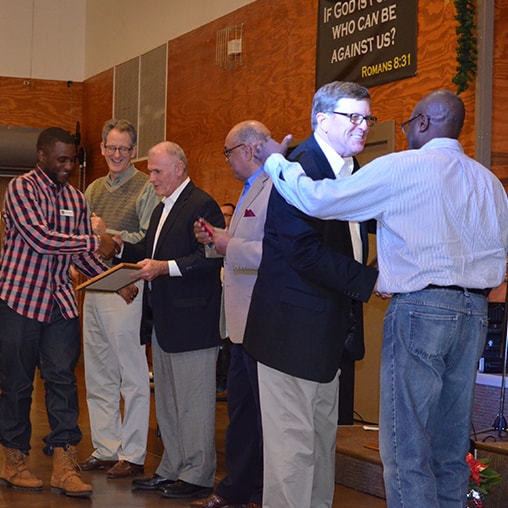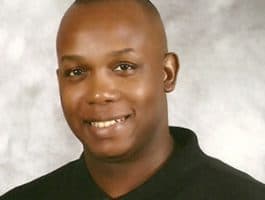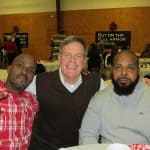
Graduating to Manhood
Men want to be men, but without a good example to follow, many fall off track. Jim Reese and Ricky Hall of the Atlanta Mission tell Dennis Rainey how God far exceeded their expectations when they took a group of 130 homeless men through Stepping Up, FamilyLife's resource for men. Hear them tell how these men were impacted and changed for the good of their families and society as a whole.
Show Notes
About the Host
About the Guest
-
Men want to be men, but without a good example to follow, many fall off track. Jim Reese and Ricky Hall of the Atlanta Mission tell Dennis Rainey how God far exceeded their expectations when they took a group of 130 homeless men through Stepping Up, FamilyLife's resource for men. Hear them tell how these men were impacted and changed for the good of their families and society as a whole.
-
Dave and Ann Wilson
Dave and Ann Wilson are hosts of FamilyLife Today®, FamilyLife’s nationally-syndicated radio program. Dave and Ann have been married for more than 38 years and have spent the last 33 teaching and mentoring couples and parents across the country. They have been featured speakers at FamilyLife’s Weekend to Remember® marriage getaway since 1993 and have also hosted their own marriage conferences across the country. Cofounders of Kensington Church—a national, multicampus church that hosts more than 14,000 visitors every weekend—the Wilsons are the creative force behind DVD teaching series Rock Your Marriage and The Survival Guide To Parenting, as well as authors of the recently released book Vertical Marriage (Zondervan, 2019). Dave is a graduate of the International School of Theology, where he received a Master of Divinity degree. A Ball State University Hall of Fame quarterback, Dave served the Detroit Lions as chaplain for 33 years. Ann attended the University of Kentucky. She has been active alongside Dave in ministry as a speaker, writer, small-group leader, and mentor to countless wives of professional athletes. The Wilsons live in the Detroit area. They have three grown sons, CJ, Austin, and Cody, three daughters-in-law, and a growing number of grandchildren.
-

Jim Reese
Jim is President and CEO of Atlanta Mission, headquartered in Atlanta, Georgia. He joined the organization in August 2008. His primary focus is to ensure that Atlanta Mission achieves its vision, “To be the premiere service provider unifying organizational and community efforts to positively change lives through a continuum of programs focused on helping poor and homeless men, women and children in the greater Atlanta area.” Before joining Atlanta Mission, Reese held the following key bus...more
Ricky Hall
Ricky first came to Atlanta Mission in 2010 as a Counselor Intern at The Potter’s House, but he quickly demonstrated an enormous amount of talent and leadership skills. In less than 2 years, he was promoted to full-time Counselor and became a spiritual role model for the residents and staff. Ricky is a licensed and ordained minister that has served churches in Alabama, Mississippi and Georgia for over 20 years. He received his education at the University of Alabama at Birmingham and Berean Sch...more
Jim Reese and Ricky Hall tell about when they took a group of homeless men through Stepping Up, and how these men were impacted and changed for the good of their families and society as a whole.
Bob: At the core, homelessness is much more than an economic issue. It all goes back to the family. Here’s Jim Reese.
Jim: Eighty-five to ninety percent of our men are going to have no dad. In fact, I’d say, in that range, no positive male influence. If you ask them, “Who really raised you at all?” it would be a mom, at best—could be a grandmother, could be an aunt, could be a neighbor. They’ve not seen what family looks like in a real sense.
Bob: This is FamilyLife Today for Wednesday, May 20th. Our host is the President of FamilyLife®, Dennis Rainey, and I’m Bob Lepine. How can you help someone who is an adult and has never had a picture of what a healthy family is supposed to look like? We’ll talk about that today. Stay tuned.
And welcome to FamilyLife Today.
1:00
Thanks for joining us. I know if there is some way that you could have opened up the auditorium at the Atlanta Mission and allowed all of our listeners—
Dennis: Oh!
Bob: —to come in—
Dennis: Oh, Bob! You don’t know—I so wished—in fact, I talked about the leadership team—you know, I came back and told you, “Why didn’t I ask you guys to go with me on that trip?” What a privilege to join 130 men who were graduating from the Stepping Up® video series, which is a series that trains men—young men, even boys—in what true biblical manhood is all about. It was a graduation ceremony.
And we’ve got the guy here with us—in fact, two guys—it was their idea. Ricky Hall and Jim Reese join us again on FamilyLife Today. Jim, Ricky, welcome back.
Ricky: Thank you, Dennis.
Jim: Great to be here.
Dennis: Ricky heads up Spiritual Life at the Atlanta Mission, and Jim, you are the CEO of that mission.
2:00
What did you think about taking a group of homeless guys through the Stepping Up video series?
Jim: Dennis, it didn’t meet it—it far exceeded. I think—you know, my heart and, clearly, the work of this was that men want to be men. Men want to be called to be men. And to just even start a series that was calling a homeless man—a man who had been addicted / a man who thought he was nothing—to believe he could be a courageous man opened the door for people to really feel like their life could be different.
When we started it and watched men—I just remember walking the halls, after we did the one on courage—and hearing the men talk about “I didn’t know I could be courageous by taking care of my family.”
Dennis: Yes, tell them about the guy who said he had no idea what courage was.
Jim: Yes, he had literally no idea what courage was until he saw that because he felt like, for him—well—courage is what everyone else did—not what he did.
3:00
The picture of: “I could be courageous by taking care of my family,” or “…my wife,” or “…my son,” or “…my daughter,” was a picture that none of them had had. And so, to be able to share that and begin to talk about that just started them on a whole different journey of expectation of: “You know what? I could be this man. I really could be this man. And I think, even though everyone tells me and have told me most of my life I can’t, somebody believes.”
Bob: You know, Ricky, I think about my own spiritual journey. There have been in my life some of those mountaintop times that are significant. You point back to them, years later, and you say, “God showed up here big, and there was catalytic change that happened in my life.” And then, there are other times where the growth has been more incremental / more plodding—it’s just one foot in front of the other—but you’re still getting somewhere. It just isn’t as obvious in a concentrated period of time.
4:00
And so, I’m wondering—you’re now several months passed the graduation—I guess I’m wondering: “How much of the Stepping Up series was one of those mountaintop moments that guys come back down—they’ve got to live in the day-to-day—or how much of it has continued to kind of recycle its way through these guys’ lives?”
Ricky: The guys that come to us that we serve—that we are blessed to serve—literally come in the worst day of their life. They really come at a moment where really things are really bad. We’ve had men come to the program out of the police car, in shackles, and they are ordered by the courts to come.
What’s happened is—is because they’ve had a message of hope, and had a picture that life could be different, and then found a relationship in Jesus Christ that God promises through His Word that He would empower them—
5:00
—they have a vision of a different future than they had when they came in. So, the message is resonating—that guys now are planning—okay—about marriage. They are thinking about spending time with their children. They are going home on Christmas pass and spending time with their family rather than that time being personal time and the immaturity that sometimes men can fall into.
Because of Stepping Up, the message is being lived out as they, even now, in a program; but they are beginning to live that message out, and we believe that God will allow that to carry on.
Bob: So, you’ll still see guys or hear guys referring back to things they learned months ago in the Stepping Up series—that’s still marked their life in some way.
Ricky: Of course; of course. And how they behave towards their family, and the letters that they write, and the things they want to do is a clear sign that God is using this message; and they are living it out.
6:00
Dennis: I have to tell you—as I shook these guys’ hands and they told me their stories—over, and over, and over again—guys would tell me: “I’ve been estranged from my wife,” “I haven’t talked to my kids, not just in months, but in years.” I mean, we’re talking about—you start talking about men in shackles. Well, there are some other kinds of shackles that they are wearing, as well, where they have completely given up all their responsibility and haven’t been the husband / the father. And guys would come up and say: “I realized I’m the only one that can be the dad to my son,” “…the protector of my daughter.”
Jim: I can still remember—about midway through, a guy who had never talked—ever talked to his 12-year-old daughter.
Dennis: Never said a word?
Jim: Never said a word—had never called. He called her while he was halfway, going through the program.
7:00
She was a Christian and showed him so much love on that phone that he connected the dots of that series to how much God would love him and how much she loved him. All he could do was beam to say, “He was scared to death to call her, but there she was.” Those were the stories. So, the family stories, in particular—reaching back to a wife—
Dennis: Yes.
Jim: —you know, that: “Now, I can call her. I’m going to call her and talk to her;” or I shared with you the young man who came back and said he was going to give to his mom the certificate that he had graduated because for the first time in his life he had completed something. He knew that his mom would be so proud of him.
And so, as you looked at those men—or I’ve got a young guy who is probably in his early 20’s with two kids—didn’t know the Lord—came to know the Lord at the mission. He shared with me that for the first time in his life—
8:00
—his mom left—would leave his house when he was eight. He was taking care of his younger brother. He now had a new picture—and for the first time in his life—a picture of what it meant to be a dad to that little three-year-old and one-year-old that he had at home.
Dennis: He had been the head of his house—
Jim: —when he was nine years old / eight years old.
Dennis: Never had a father—
Jim: Never had a father.
Dennis: —to show him the way.
Jim: Was in gangs at 12—selling drugs at 15. Now, he sat there—and I think that the power of the series, in particular, for our men was it gave them a picture of what they could be.
Bob: The guys that you took through this series are guys who are in a particular program at the Atlanta Mission. It’s a program for guys who have dealt with or are dealing with substance abuse; right?—drug/alcohol—
Jim: Or just really even life-controlling issues.
Bob: How long are these guys in a program like that, and what’s the long-term impact? How many of these guys go through it and stay sober?
9:00
How many of them slip? I mean, do you have any sense of that?
Jim: They can stay up to a year—I mean, most will stay up to a year. The rate is anywhere from 25-50 percent are going to make it; but again, I think [there are] incremental steps of making it. So, you know, a fall-back doesn’t mean a fall to the end.
Bob: Right.
Jim: And so, I think that the belief—at least, from what I saw in this—going back home with a picture of being a dad, that they’ve never had in their life, or a husband. I am anxious to see how many will do better because—what I realized, as we were going through this was, none had a picture of what that looked like. Well, they are going back now, at least, with a tool to say, “I want to be that man.”
In fact, one of the men said to me: “You know, Jim, what I learned—what was the biggest thing I learned? I got to step up every day.” So, you know, your question of: “What’s the longevity—what does it look like?”
10:00
He came away with a great picture of: “This isn’t what I’m getting—I’ll come in and out of this. I’ve got to step up. I’ve got to think about and live with intentionality as I start every day.”
Bob: There are two short films that we include in the Stepping Up series that I have to tell you—when we were putting it together, we wondered if this was going to be pushing the boundaries too much. One is a story that has a guy going in for a job interview. He winds up going to a bar at 9:30 in the morning. You know this story—
Jim: Absolutely.
Bob: —I’m talking about. And the bartender says, “Well, you need to man up a little bit,” and starts pushing beer at him; right? And he winds up drinking too much.
There is another story where a son—
Jim: Yes.
Bob: —is supposed to be home—he’s not home. Dad goes out looking for him to try to get him home / get him to—and Dad winds up playing pool and doing shots with his son.
And I remember as we were putting this together—I’m thinking: “You know? I don’t know that our church-going audience is going to really resonate.”
11:00
In fact, we’ve gotten some letters, over the years, from folks saying, “Why did you include drinking in the Stepping Up series?” I’ve talked to some of these folks; and I’ve said: “Well, we never showed drinking in a positive light—never showed it as something that was noble / honorable. We’ll leave that for folks—that drinking in moderation question—we’ll leave that for their own conscience.”
I was just curious: “As you are dealing with guys with substance abuse, and we’ve got a couple scenes like that, were there any comments about that? Any thoughts about that?—do you remember?”
Ricky: Our guys really just associated that with real life. This is what real men deal with. It brought a sense of reality to the series and that it wasn’t just something that was kind of in a foreign world to them. This is real life / this is what men do—this is what they deal with. So, for our guys, it was no issue whatsoever.
Bob: Pretty tame, maybe.
Jim: Right. And I think it gave them a picture, too, of a way to laugh at the foolishness of some of the decisions they’d made.
12:00
Bob: Yes.
Jim: They know that there have been times where they either did drugs or alcohol that they maybe messed up one of the most important days in their life. And so, I think it gave them a chance to look at that, but not be so self-critical. I think that was one of the things about the series—it wasn’t about what you shouldn’t do—it was about what you should do. That’s what our guys loved—it was not: “Don’t do this,”—it was: “Be this.” And I think what they took away was, not only a call to a different life, but a picture of a different life they had never seen.
Dennis: Yes, I’m thinking of a guy—and I told you about this earlier. I was eating dinner and went and sat down at a table with two other guys. One of the guys, across the table—I forget his name—but he looked at me and said: “Mr. Rainey, when I was six years old, my mom would leave for days/weeks. My dad has always been in prison.
13:00
“I had no picture of what it looked like to be a man. I’ve met my dad twice.”
And he said, “I was in charge of the family at six.” He said, “I would get all this advice from one side and then other advice from another group of people, and I was confused. I didn’t know what was right—what the real picture was. And what has happened in Stepping Up is—I realized that the Bible—this is the standard. This is going to help me think square about how to be a man.”
He was married; but he had really gotten hope because he had seen, biblically, what is expected of a man and how the Bible will equip a man, even who comes from the most horrific background. I mean, his slate of what it looks like to be a man was blank—he had no picture there.
Jim: Right.
Dennis: You’ve seen other men in this same situation?
Jim: That, to me, Dennis—it painted a picture. And I think the belief that Christ could really allow them to live that life was really one of the biggest things of it.
14:00
And so, they didn’t walk with a lack of confidence; but they didn’t, also, walk with confidence in themselves. They walked out knowing, “I couldn’t do this alone, but I could do this with Christ.” And I think that was what gave them hope: “I know I can’t do this, but it’s a different picture. And with Christ, you know what? All things really are possible; and I could do this.”
Dennis: Yes.
Bob: Our mission, here at FamilyLife, is to effectively develop godly families because we believe that if you have strong, intact, healthy families, that’ll change your life / it’ll change the culture. It’ll change the world, eventually.
I’m just curious—I don’t know if you have statistics or if you just anecdotally—if you’ve got a thousand people you’re serving every day at the Atlanta Mission, any idea how many of those thousand grew up in a family where there was both a mom and a dad in the home, and it was intact, and they had some stability in their home?
15:00
Jim: Eight-five to ninety percent of our men are going to have no dad. In fact, I’d say, in that range, no positive male influence. If you asked them: “Who really raised them at all?” it would be a mom, at best—could be a grandmother, could be an aunt, could be a neighbor / or women with our kids—same situation, Bob. They’ve not seen what family looks like in a real sense at all. Now, there are some that have, obviously. There are some that grew up in good families and had that; but that’s 10/15 percent, maximum.
Bob: If we wanted to make a dent in the homeless population in America—if we could somehow get moms and dads to love each other, stay together, and take care of the kids, that would have an impact; wouldn’t it?
Jim: Yes. You know, I think that we’re cleaning up the mess. If we could keep families together—start with families—we could get us out of business.
Dennis: Yes, let’s start with families—
16:00
Jim: It starts with families.
Dennis: —with a mom and a dad together. Let’s not be having babies where single parent moms are trying to do this by themselves—they’re heroic—but little boys / little girls need a dad. You had a great one, Ricky.
Ricky: Indeed. And I tell you—it’s been the treasure of my life. I thank God many a day that I have my parents, but it’s made the difference. And without them, my life would have followed a much different path—I’m sure.
Dennis: You know, before we’re done here today, I’m going to give you a very unique opportunity. Before I give you that opportunity, there is one last story, Jim, I want you to tell. It’s about Jack. He’s one of your staff members—
Jim: Yes.
Dennis: —who went through Stepping Up with the homeless guys. In Session 10, God had something very specific He wanted to convict him of.
Jim: We were watching the story about Brother Paul, and I’m in the room with him.
17:00
He’s in the small group that we’re going through it together with. All of a sudden, he just starts weeping uncontrollably.
Dennis: Now, before you tell what happened there—Bob, explain the story of Brother Paul that’s in Session 15.
Bob: Yes, Brother Paul tells about his own dad—who grew up as an amateur boxer and as a fire-fighter / grew up in the cotton fields of Arkansas—and grew up racially prejudiced. Although he had black friends, he had a sense that whites were superior to blacks. By the time he was a fire-fighter, he was at a fire station right outside of Central High School in Little Rock when—a lot of listeners will know—Little Rock’s Central High School was a scene where integration happened in the late 1950’s. There were a lot of white folks who were not happy with that.
And Brother Paul’s dad was at the fire station that day, watching the unrest take place. He saw one of his old friends that he had grown up with—
18:00
—an African American friend—who came up to him and saw him at the fire station—put out his hand and said, “Mr. Paul.” And Paul Holderfield said, to his shame, he would not put out his hand—he put it behind his back. He was afraid what the other fire-fighters were going to think if they saw him shaking the hand of a black person.
That man walked away, obviously, disappointed that a guy he thought was his friend had snubbed him like that. It’s a powerful story because ultimately Paul Holderfield went back and reconciled with that man—sought him out, asked for forgiveness, and then gave his life to caring for the needs of anyone who was in need by developing a homeless ministry in a food kitchen and taking care of these folks.
We really present him, in the series, as an example of a guy whose life was touched by Christ; and he became a patriarch.
Jim: Yes, and so, for Jack—
19:00
—he’s watching this. All of a sudden, this weeping starts. And I’m wondering: “What’s happening?” to be honest with you—and he doesn’t stop. It ends; and Jack says, “I grew up—my whole family, including myself, was a racist.” And he starts crying again. He says: “Until I came to the mission and went through the program, for the first time in my life, I really realized blacks and whites—we are all brothers. But the rest of my family is still racists.”
So, in our study—had another guy on our staff, who is African American, who looked at him and said, “Jack, you can’t change the past, but you can change the future,”—and really gave him freedom. Then, that incredible night, Dennis, when you and Brother Paul came—which we didn’t expect—I had the chance to introduce Jack to Brother Paul.
20:00
Bob: You know, it may be that some of our listeners would be interested in seeing what Jack saw—see Brother Paul share his story about his dad from the Stepping Up series. We’ve got that clip available on our website at FamilyLifeToday.com. Go to the website and click the link in the upper left-hand corner of the screen that says, “GO DEEPER.” The clip from the Stepping Up video series is available right there.
There is also information about the Stepping Up series. This may be something you’d like to take a group of guys through—whether it’s fathers and sons, a small group that you get together with on a regular basis—maybe, there is a ministry opportunity near you with guys who would benefit from having someone take them through this ten-week video series. Find out more about the Stepping Up material when you go to FamilyLifeToday.com and click the link that says, “GO DEEPER,” in the upper left-hand corner of the screen; or call 1-800-FL-TODAY for more information about the series. Ask about Stepping Up when you get in touch with us.
21:00
And I think it is appropriate today to again say, “Thank you,” to our Legacy Partners and other friends of this ministry who, through the years, have supported what we do. You’ve made things like the Stepping Up video series possible. You make this daily radio program possible with your faithful support to keep this ministry on the air in your community. We are grateful for the partnership we have with you in this work.
And I wanted to let you know that, during the month of May, something exciting is happening here. We’ve had some friends of the ministry who have agreed that they will match every donation we receive this month, on a dollar-for-dollar basis, up to a total of $300,000. So, as listeners have been calling this month and saying, “I’d like to give $30 dollars,” “I’d like to give $50,” “…$100,”—whatever you are able to donate in support of the ministry—each of those donations has been doubled in its impact because of the matching-gift fund that has been established.
Would you consider making a donation today?
22:00
Go to FamilyLifeToday.com. Click the link in the upper right-hand corner of the screen that says, “I CARE.” You can make an online donation there. Or call 1-800-FL-TODAY to make a donation over the phone. Or mail your donation to FamilyLife Today at PO Box 7111, Little Rock, AR; and our zip code is 72223.
Dennis?
Dennis: Well, it’s been our privilege to have a couple of kindred spirit warriors with us here this week—Jim Reese and Ricky Hall. And Ricky, I told you I was going to give you a great privilege.
Ricky: Yes, sir.
Dennis: You’ve been talking about the strength of the family you came from. I’m going to seat your parents across the table from you, right now.
Ricky: Oh, wow!
Bob: Now, we don’t have them out here in the hall—
Ricky: I know—I’ve got it.
Bob: —a little theater of the mind.
Ricky: I understand that.
Dennis: Alright? But you have an opportunity to give them a verbal tribute. I wrote a book one time called The Forgotten Commandment.
23:00
It’s about writing your parents a tribute and then reading it to them.
Now, I know you haven’t written this down, but it is written on your heart. What I want you to do is speak to them by their names of what you called them when you grew up, as a young man. I want you to honor them here, on FamilyLife Today, for the parents they were.
Ricky: Wow! Indeed, this is a great, great honor for me.
Mom / Dad, I don’t even know where to start. You guys have given me everything that any son could ever want in life. You didn’t have large sums of money in the bank to give me. You didn’t have things that other people value, but you gave me what was the most important—your love.
24:00
You taught me to fear God. You taught me to love my family and to be a man.
Dad, you’re the greatest man I know. Mom, you’re the greatest woman that I know. And I know that other people have told you; but your son is telling you that I love you, and I respect you, and I thank God for you every single day. And you are the finest people that I’ve ever been around. I just want you to know that I love you so much and thank God that you’re my parents.
Bob: FamilyLife Today is a production of FamilyLife of Little Rock, Arkansas.
Help for today. Hope for tomorrow.
We are so happy to provide these transcripts to you. However, there is a cost to produce them for our website. If you’ve benefited from the broadcast transcripts, would you consider donating today to help defray the costs?
Copyright © 2015 FamilyLife. All rights reserved.
1




